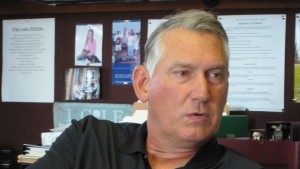For years friends and insiders have affectionately referred to John Anderson as “14.” On Saturday his uniform number as the Golden Gophers baseball coach will be retired in a pregame ceremony at Siebert Field.
Prior to the 2 p.m. game against Michigan State there will be a special event commemorating his glorious place in University of Minnesota sports history. Fans are encouraged to be in their seats by 1:15 p.m. to pay tribute to the longest tenured coach (any sport) in Gopher history. The first 500 fans (gates open 12:30 p.m.) in attendance will receive a John Anderson commemorative pennant in recognition of his final season coaching the Gophers.
A mural of Anderson will be unveiled on the left field wall at Siebert Field as part of the pregame ceremony. His mural will be the seventh added to the wall. He will join former Gophers Paul Giel (No. 34), Dick Siebert (No. 24), Dave Winfield (No. 31), Paul Molitor (No. 11), David Chelesnik (No. 26) and Herb “Ike” Isakson (No. 5) in having his number retired.

Anderson, who turns 69 next week, announced in December that the 2024 season would be his final. This weekend’s Friday-Sunday series with the Spartans will be the last at home for Anderson who is in his 43rd season leading the Gophers. In a remarkable feat of longevity, this is his 49th season overall at Minnesota counting time as a player, student assistant coach, graduate assistant, and assistant coach.
It’s believed Bethel coach and 1990 Gophers All-American second baseman Brian Raabe will succeed Anderson. Raabe is in his 13th season at Bethel and is much admired on and off the field. At 56, he won’t approach the longevity of Anderson but as a former Gopher and learned baseball man he has the “right stuff” to carry on the tradition of the oldest sport at the U.
Since taking over as Gophers’ head coach in 1981, Anderson has been named the Big Ten Coach of the Year eight times. The winningest coach in Big Ten baseball history, his teams have won 11 regular season conference titles and 10 postseason league tournaments. Among his hall of fame inductions is membership in the American Baseball Coaches Association, an honor that came in 2008.
Anderson has coached 28 All-Americans, nine Big Ten Players of the Year, three Big Ten Pitchers of the Year and four Big Ten Freshman of the Year. He has seen 115 of his players drafted by major league teams.
In 36 consecutive years MLB teams have drafted Anderson’s players. The streak is the longest in the Big Ten, ahead of Ohio State (12 years) and Michigan (10 years.)
To know Anderson even casually, though, is to recognize his career satisfaction extends deeply into how much he cares about the well-being of his players as individuals. He knows his role is that of a teacher devoted to guiding his players way beyond baseball, helping develop their academics, life skills and character with the intent they can thrive as adults in a competitive and changing world.
“It’s not just about wins and losses,” Anderson said in an interview last spring. “My philosophy has always been I am here to prepare people for the next 50 years of their lives. Kids have to understand there’s a 50 percent less chance to play professional baseball today because the draft got reduced by 20 rounds. You better be preparing people for life after baseball.”
Anderson told Sports Headliners then that 100 percent of his seniors would graduate with degrees from the U. During his time as head coach, he’s had 335 Academic All-Big Ten selections.
The Gophers have had just three coaches since 1948, including Dick Siebert who won three national championships before retiring in 1978. Anderson, a Minnesota native, was a pitcher for the “Chief” in 1974-1975 before sustaining an injury and becoming a student coach. At 26, he succeeded George Thomas (1979-1981) as head coach. He had been an assistant coach to Thomas.
Anderson’s character and track record of success on and off the field drew suggestions over the years by boosters that the U administration make him the athletic director. Instead, he has worked for nine athletic directors including interim hires.
There is no doubting his leadership and devotion to the U. He could have left for better paying jobs, including ones with more resources for winning but he has been loyal to the end to his program, players and school.
Born in Hibbing and a graduate of Nashwauk-Keewatin High School, Anderson once told me this about his tenure at the U: “I don’t want to be here, just to be here.”
Gulp.
No one would ever think that about 14.






Dave,
Great tribute to a great coach & man!
What a great baseball coach, but more importantly an amazing human being. The likes of him won’t be seen again at the University of Minnesota or anywhere else.